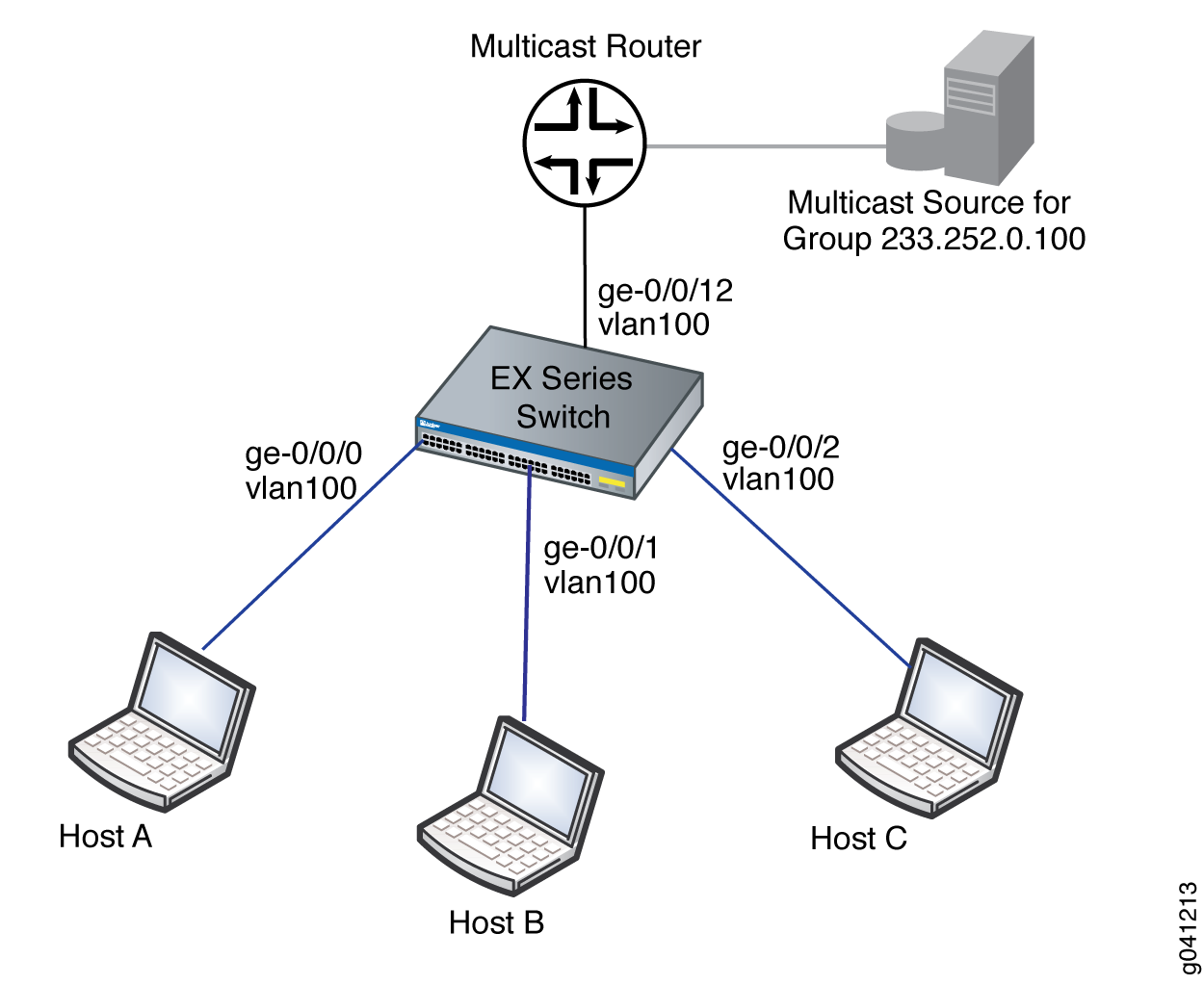Example: Configuring IGMP Snooping on EX Series Switches
You can enable IGMP snooping on a VLAN to constrain the flooding of IPv4 multicast traffic on a VLAN. When IGMP snooping is enabled, a switch examines IGMP messages between hosts and multicast routers and learns which hosts are interested in receiving multicast traffic for a multicast group. Based on what it learns, the switch then forwards multicast traffic only to those interfaces connected to interested receivers instead of flooding the traffic to all interfaces.
This example describes how to configure IGMP snooping:
Requirements
This example uses the following software and hardware components:
One EX Series switch.
Before you configure IGMP snooping, be sure you have:
Configured the vlan100 VLAN on the switch
Assigned interfaces ge-0/0/0, ge-0/0/1, ge-0/0/2, and ge-0/0/12 to vlan100
Configure ge-0/0/12 as a trunk interface.
Overview and Topology
In this example, interfaces ge-0/0/0, ge-0/0/1, and ge-0/0/2 on the switch are in vlan100 and are connected to hosts that are potential multicast receivers. Interface ge-0/0/12, a trunk interface also in vlan100, is connected to a multicast router. The router acts as the IGMP querier and forwards multicast traffic for group 233.255.0.100 to the switch from a multicast source.
Topology
The example topology is illustrated in Figure 1.

In this example topology, the multicast router forwards multicast traffic to the switch from the source when it receives a membership report for group 233.255.0.100 from one of the hosts—for example, Host B. If IGMP snooping is not enabled on vlan100, the switch floods the multicast traffic on all interfaces in vlan100 (except for interface ge-0/0/12). If IGMP snooping is enabled on vlan100, the switch monitors the IGMP messages between the hosts and router, allowing it to determine that only Host B is interested in receiving the multicast traffic. The switch then forwards the multicast traffic only to interface ge-0/0/1.
IGMP snooping is enabled on all VLANs in the default factory configuration. For many implementations, IGMP snooping requires no additional configuration. This example shows how to perform the following optional configurations, which can reduce group join and leave latency:
Configure immediate leave on the VLAN. When immediate leave is configured, the switch stops forwarding multicast traffic on an interface when it detects that the last member of the multicast group has left the group. If immediate leave is not configured, the switch waits until the group-specific queries time out before it stops forwarding traffic.
Immediate leave is supported by IGMP version 2 (IGMPv2) and IGMPv3. With IGMPv2, we recommend that you configure immediate leave only when there is only one IGMP host on an interface. In IGMPv2, only one host on a interface sends a membership report in response to a group-specifc query—any other interested hosts suppress their reports to avoid a flood of reports for the same group. This report-suppression feature means that the switch only knows about one interested host at any given time.
Configure ge-0/0/12 as a static multicast-router interface. In this topology, ge-0/0/12 always leads to the multicast router. By statically configuring ge-0/0/12 as a multicast-router interface, you avoid any delay imposed by the switch having to learn that ge-0/0/12 is a multicast-router interface.
Configuration
To configure IGMP snooping on a switch:
Procedure
CLI Quick Configuration
To quickly configure IGMP snooping, copy the following commands and paste them into the switch terminal window:
[edit] set protocols igmp-snooping vlan vlan100 immediate-leave set protocols igmp-snooping vlan vlan100 interface ge-0/0/12 multicast-router-interface
Step-by-Step Procedure
To configure IGMP snooping on vlan100:
Configure the switch to immediately remove a group membership from an interface when it receives a leave report from the last member of the group on the interface:
[edit protocols] user@switch# set igmp-snooping vlan vlan100 immediate-leave
Statically configure interface ge-0/0/12 as a multicast-router interface:
[edit protocols] user@switch# set igmp-snooping vlan vlan100 interface ge-0/0/12 multicast-router-interface
Results
Check the results of the configuration:
[edit protocols]
user@switch# show igmp-snooping
vlan all;
vlan vlan100 {
immediate-leave;
interface ge-0/0/12.0 {
multicast-router-interface;
}
}Verifying IGMP Snooping Operation
To verify that IGMP snooping is operating as configured, perform the following task:
Displaying IGMP Snooping Information for VLAN vlan100
Purpose
Verify that IGMP snooping is enabled on vlan100 and that ge-0/0/12 is recognized as a multicast-router interface.
Action
Enter the following command:
user@switch> show igmp-snooping vlans vlan vlan100 detail
VLAN: vlan100, Tag: 100
Interface: ge-0/0/12.0, tagged, Groups: 0, Router
Meaning
By showing information for vlan100, the command output confirms that IGMP snooping is configured on the VLAN. Interface ge-0/0/12.0 is listed as multicast-router interface, as configured. Because none of the host interfaces are listed, none of the hosts are currently receivers for the multicast group.
